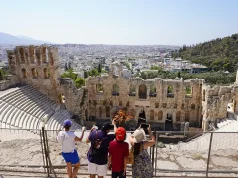
As emerging technologies continue to reshape how travelers plan, enjoy, and remember their experiences, the travel industry is undergoing a tremendous transformation. Digital advancements, such as blockchain and artificial intelligence, are not only improving user experiences but also increasing safety, streamlining processes, and generating new business models. The need for efficiency, safety, and personalization is more crucial than ever as travel picks up steam worldwide after the pandemic. Every element of the travel industry, from hotels and airports to cruise lines and ride-sharing services, is undergoing a technological revolution as a result of this demand. This post will examine the major technological developments that are changing the travel sector and their implications for businesses and customers.
Machine Learning and Artificial Intelligence Are Driving Personalization
Machine learning and artificial intelligence (AI) are transforming how travel agencies communicate with their clients. Large volumes of data, such as browsing patterns, previous reservations, consumer preferences, and real-time location data, may be analyzed by organizations thanks to these technologies. From suggesting travel locations and lodging to providing specialized promos and assistance, all contribute to the creation of highly customized experiences. AI-powered chatbots now respond to customer support inquiries around the clock, cutting down on wait times and raising customer satisfaction. AI-driven recommendation engines are being used by airlines and online travel firms to increase cross-selling and upselling, providing everything from local activities to rental cars.
The Smart Travel Experience is Improved by the Internet of Things (IoT)
Travelers’ convenience and efficiency are being greatly enhanced by the Internet of Things (IoT). Examples include hotel rooms with IoT sensors to adjust the temperature and lighting, smart luggage that can be followed through smartphone apps, and airport beacons that direct passengers to their gates. Wearable IoT devices are used by cruise lines and resorts to expedite check-ins, process payments, and monitor visitor activity to improve service. In order to cut down on delays and increase safety, airlines are using sensors to track airplane maintenance in real time.
Vibration Analysis for Travel That Is Safer and More Dependable
Vibration analysis is a developing technology that has a significant impact on safety and maintenance in the travel industry, even though it might not be the most obvious trend to tourists. This method is frequently applied in predictive maintenance for buses, trains, and airplanes. Technicians can identify early indications of wear and malfunction by using reliable vibration analysis solutions, measuring, and examining the vibration patterns of engines, motors, and mechanical parts. This makes preventative repairs possible, lowering the possibility of malfunctions or delays and improving passenger safety. Vibration analysis is used in aviation, for example, to make sure that landing gear and turbines operate within allowable vibration ranges.
Blockchain Technology Increases Efficiency and Trust
Best recognized for its use in cryptocurrencies, blockchain technology is also finding useful uses in the travel industry. Its secure and decentralized ledger architecture is perfect for handling identity verification and payments. Without the need for middlemen, blockchain can streamline and secure transactions like making reservations for hotels, airlines, and vacation packages. Additionally, it guarantees loyalty program transparency, enabling users to consistently redeem points across various companies. Blockchain technology is being investigated by airports and immigration officials for the storage and verification of travel documents such as COVID-19 immunization certificates and visas.
Augmented Reality and Virtual Reality Improve the Travel Experience
Even before the trip starts, virtual reality (VR) and augmented reality (AR) are being used to improve customer engagement and offer immersive experiences. Before making a reservation, passengers can take virtual tours of hotels, locations, or cruise ships thanks to the growing usage of virtual reality (VR) in the planning stage. Higher conversion rates are frequently the result of this engaging content’s ability to inspire confidence and excitement. AR, however, enhances experiences in the real world. Travelers can utilize augmented reality (AR) apps to view restaurant menus in their local tongue, get real-time navigation in new locations, and see historical material superimposed on landmarks. AR is also being used by museums, theme parks, and other cultural institutions to develop interactive displays that appeal to both adults and children.
Businesses that adopt these trends will be better equipped to satisfy contemporary needs and foster enduring client loyalty as travelers look for experiences that are more seamless, customized, and technologically advanced. Keep in mind that technology is helping to pave the path for the revolution that lies ahead, so embrace it today!



